Dogs are beings that carry sincere love in their hearts. The same can be said for babies and young children whose feelings are not yet spoiled by the outside world.
Considering that, it is not a surprise that the hearts of many people melt when they witness stories about babies and their furry companions. They are always filled with nothing but pure love and cuteness in every sense.
This is just a story you will read today, and it is about one fluffy dog named Reus who fell in love with his baby sister, Lisa, the very first day she was born. From that moment on, he did not let her out of his sight, and today, neither of them can imagine life without each other.
Only Baby In The Room
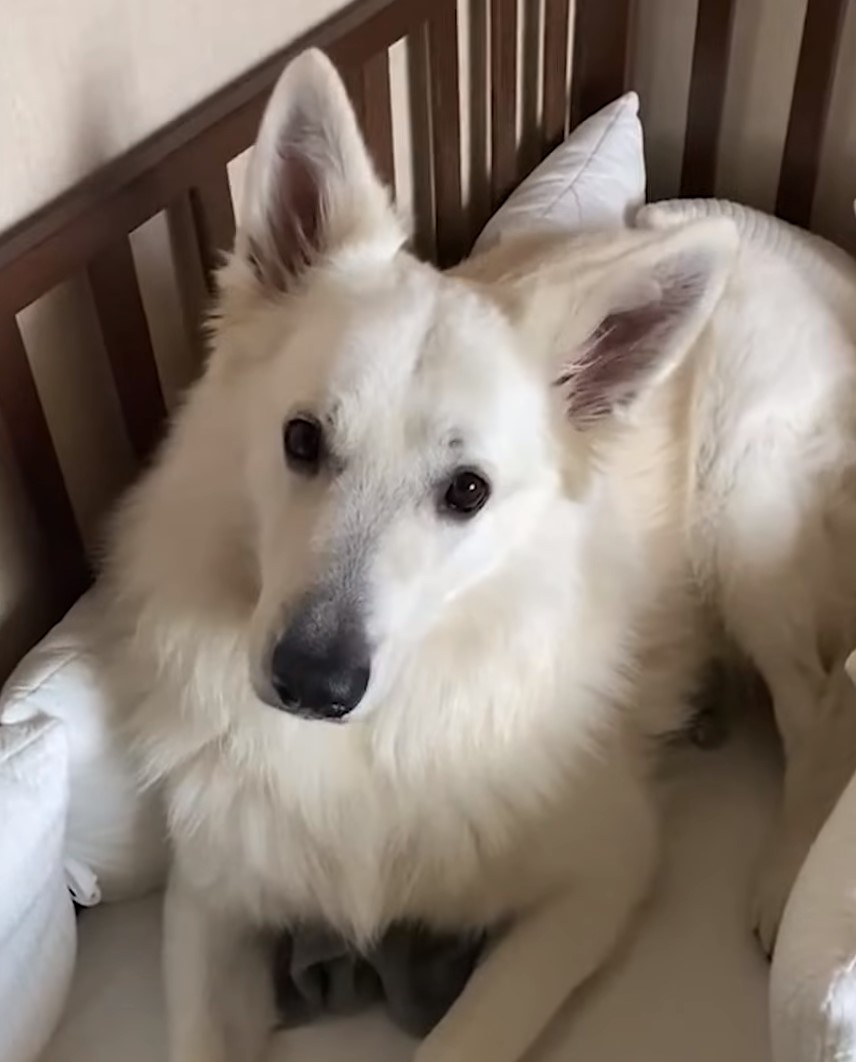
Long before baby Lisa came into this world, Anastasia and her family were thinking about adopting a dog. They wanted him so desperately, but they knew it was a really big decision.
However, when their friends gifted them a beautiful white puppy, they just couldn’t say “no”. They immediately fell in love with him and decided to call him Reus. From puppyhood to his older days, every moment with Reus was pure happiness for these people.
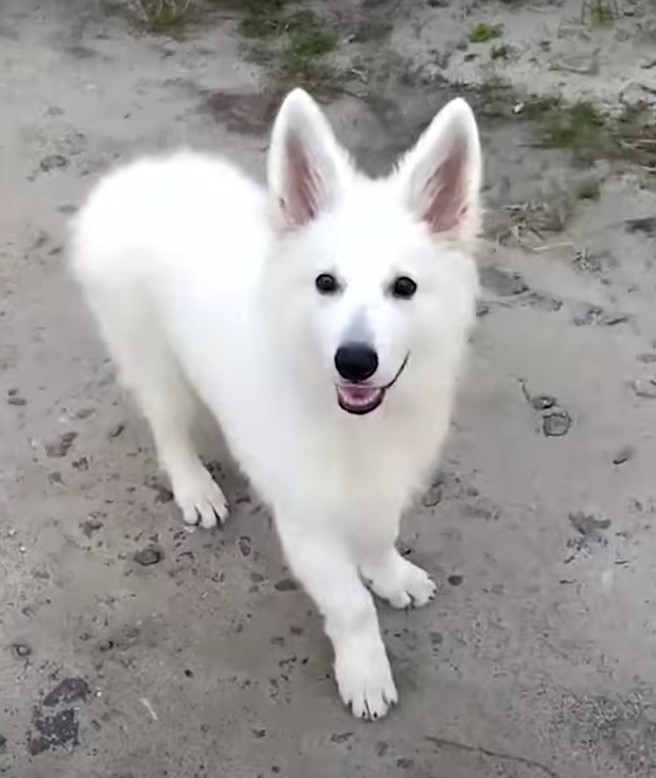
“I’d never met a dog so smart and friendly,” Anastasia told Cuddle Buddies. “He never acted out or made a mess, well unless there was mud, but in classic puppy-fashion, he was the center of attention.”
Reus was the only baby in the room, and he enjoyed that status very much. Anastasia said that he didn’t like cuddles or lots of pets like other dogs, but “he was always happy to play and run.”
“Reus was so special, a perfect family dog,” Anastasia said, adding: “But little did he know, things were about to change.”
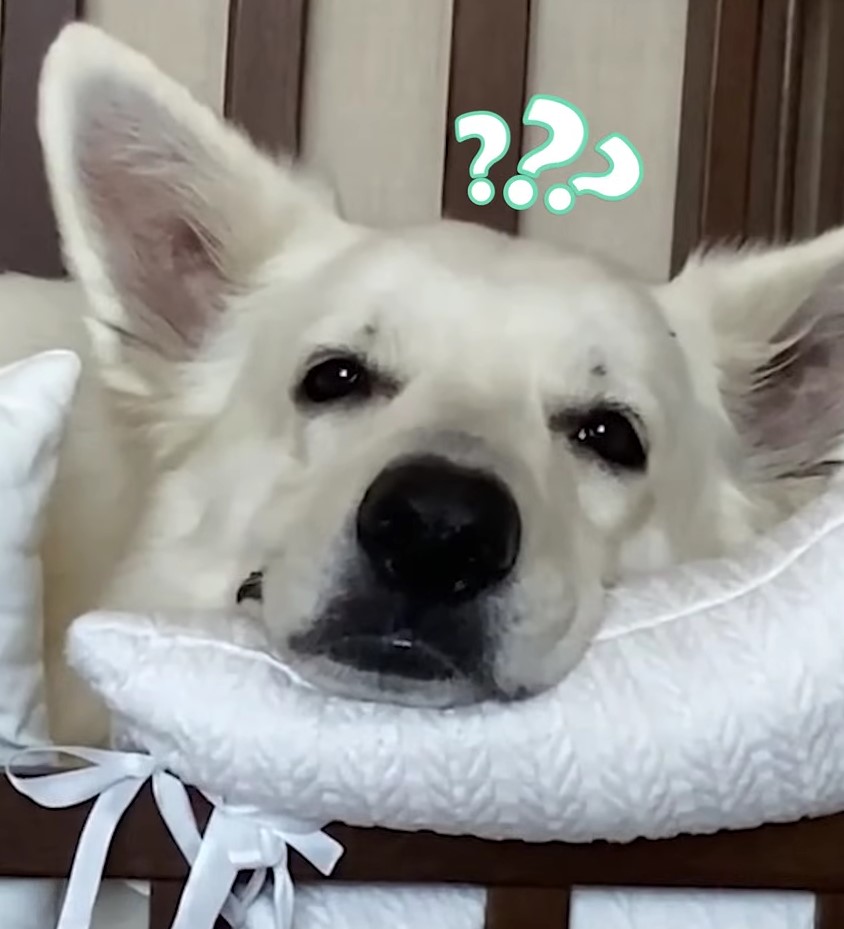
Soon, Reus will no longer be the center of attention, but it won’t affect him that much. In fact, it will bring him even greater joy.
His Happiest Day
After Anastasia became pregnant with Lisa, Reus was no longer separated from her. He constantly lay in her lap and kept his head on her stomach. It was as if he had felt that great happiness was on its way.
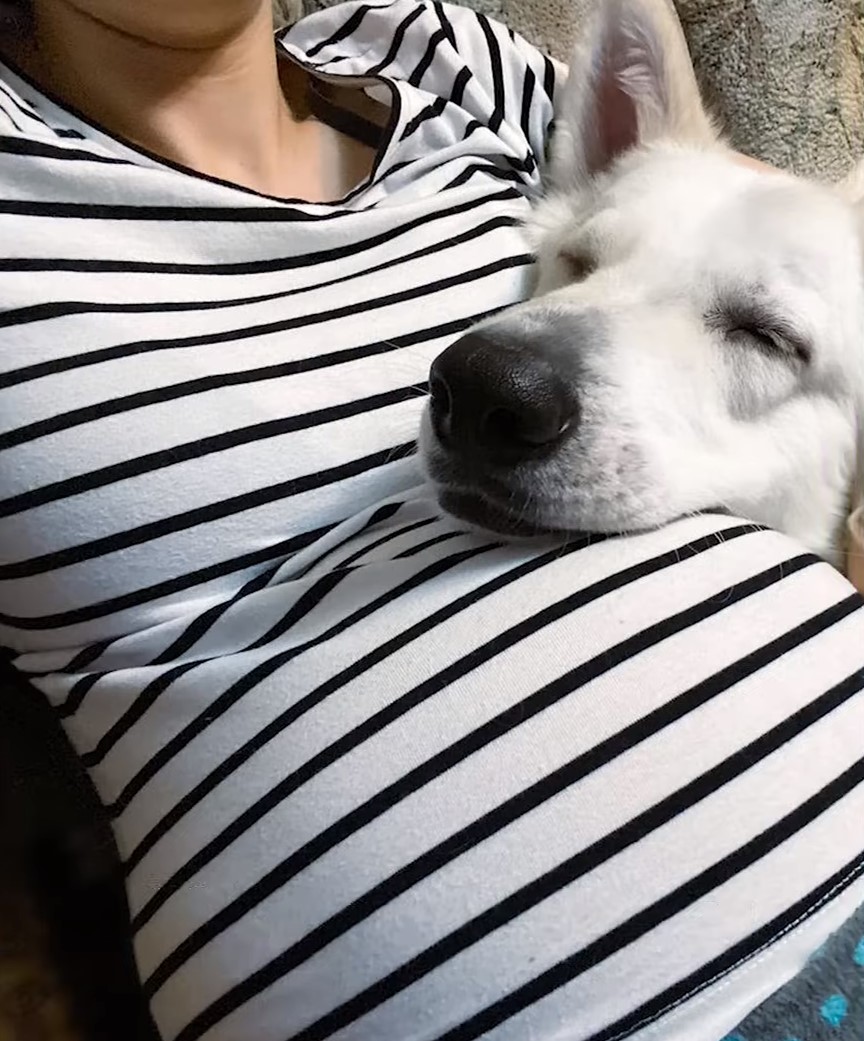
“At the time I wasn’t sure what to think but I knew we had to plan for him to meet the baby,” Anastasia said.
When that day finally came, and Lisa was born, Anastasia decided to put her in a crib and let Reus come to her. To her delight, that’s exactly what happened. Reus was very confused in the beginning, but after some time, everything fell into place.
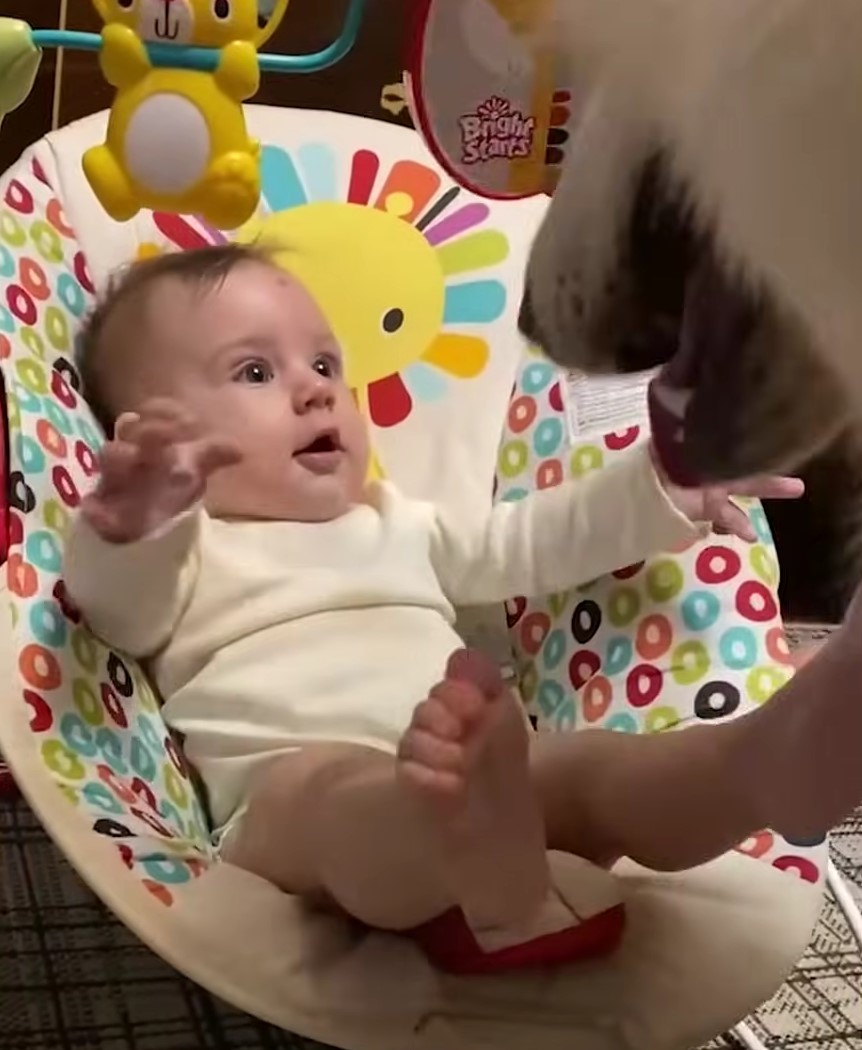
“He was very confused at first, he had never seen a baby before,” Anastasia said. “But somewhere in those minutes, he decided he would always protect this tiny thing.”
From that moment, their love story began. Reus never let his sister out of his sight and was by her side at all moments – both when she cried and when she laughed. The day she started crawling was the happiest of his life.
In the meantime, some difficult times came for their country, and Reus had more obligations because he had to go with his mother to support the children and the elderly. However, at the end of the day, he would always return to his favorite girl, just like a guardian angel.
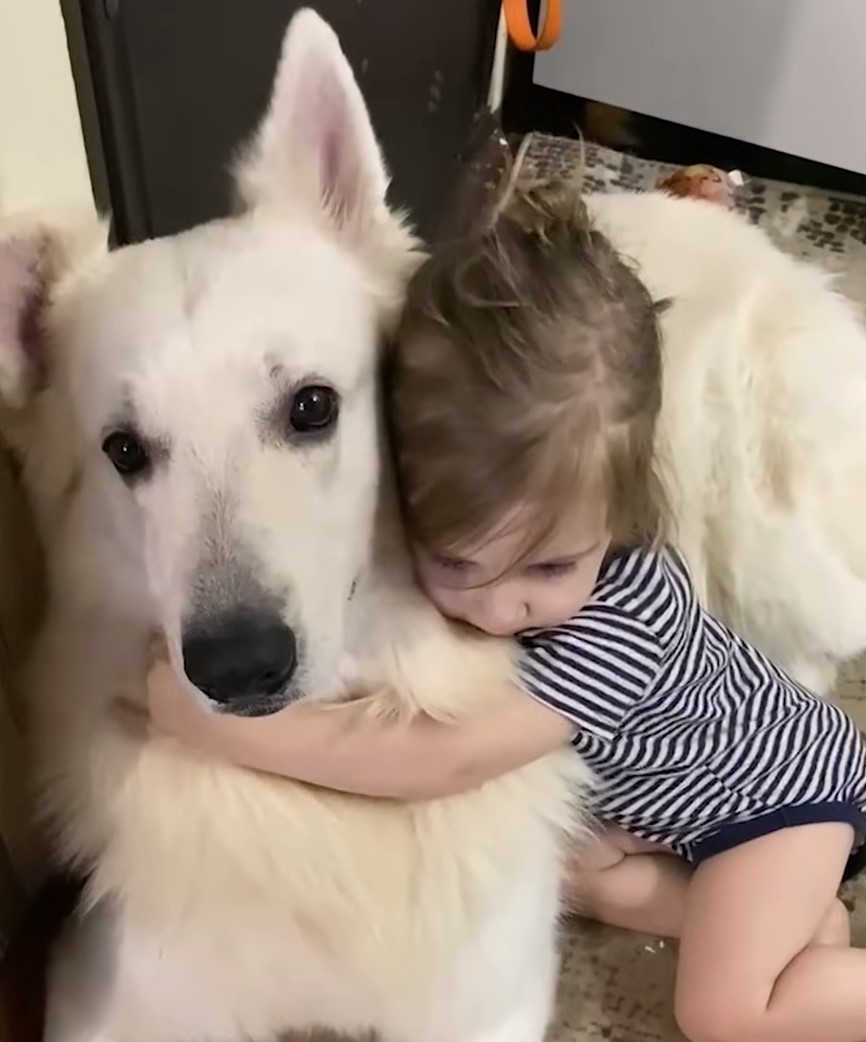
“Even though things are still uncertain, I know Reus protects my family,” Anastasia said. “But most of all, he protects his best friend.”
It is a fairy tale that continues to this day.
When it comes to your furry companion, keeping them safe and healthy is a top priority. One aspect of their well-being that often goes overlooked is their diet. You might not realize it, but some common foods found in your pantry can be toxic to your four-legged friend. As a seasoned dog trainer, I’ve seen firsthand the importance of understanding what foods can harm your pup.
From everyday snacks to seemingly harmless ingredients, the list of potential toxic foods for dogs might surprise you. As you navigate the aisles of the grocery store or prepare meals at home, being aware of these dangers is crucial in ensuring your dog’s health and happiness. Stay tuned as we uncover the hidden hazards lurking in your kitchen that could pose a risk to your beloved pet.
Understanding Toxic Foods for Dogs
When it comes to your furry friend’s well-being, being aware of what foods can be toxic to dogs is crucial. Here are some common items found in most households that can pose a risk to your canine companion:
Grapes and Raisins
These seemingly harmless fruits can lead to kidney failure in dogs. Ensure your pet stays away from anything containing grapes or raisins.
Chocolate
Chocolate contains theobromine, a substance that is toxic to dogs. Even a small amount can cause serious health issues, so it’s best to keep all forms of chocolate out of your dog’s reach.
Xylitol
This sugar substitute is often found in sugar-free gum, candy, and even some peanut butter. Xylitol can lead to a dangerous drop in blood sugar levels and liver failure in dogs.
Onions and Garlic
These ingredients, whether raw, cooked, or in powdered form, can cause damage to your dog’s red blood cells, leading to anemia. Make sure to avoid feeding your dog any foods seasoned with onions or garlic.
Alcohol
Alcohol, even in small amounts, can have severe effects on dogs, including vomiting, coordination issues, and in extreme cases, respiratory failure. Keep all alcoholic beverages away from your pet.
Caffeine
Caffeinated beverages and foods can be harmful to dogs due to their stimulant properties. Ensure your dog does not ingest any products containing caffeine.
Being mindful of these toxic foods and keeping them out of your dog’s reach is essential for their safety and well-being. Your furry friend relies on you to protect them from potential hazards, so make sure to provide a safe environment free from these harmful items.
Common Foods Toxic to Dogs
When it comes to your furry friend, you must be aware of what foods could harm them. Here are some common foods that are toxic to dogs:
Grapes and Raisins
These seemingly harmless fruits can cause kidney failure in dogs. Avoid letting your dog snack on them.
Chocolate
Chocolate contains theobromine, which is toxic to dogs. It can affect their heart and nervous system.
Xylitol
Xylitol, often found in sugar-free gum and candies, can lead to a rapid drop in your dog’s blood sugar, causing weakness and seizures.
Onions and Garlic
Onions and garlic, in any form (raw, cooked, or powdered), can cause damage to your dog’s red blood cells, leading to anemia.
Alcohol
Even a small amount of alcohol can be dangerous for dogs, causing vomiting, coordination problems, and even coma.
Caffeine
Caffeine can be fatal to dogs if ingested in large amounts. It can lead to restlessness, rapid breathing, and heart palpitations.
Keeping these foods away from your dog is crucial for their well-being. Remember, prevention is key to keeping your canine companion safe and healthy.
Symptoms of Food Toxicity in Dogs
Here are some common symptoms that your dog may display if they have ingested toxic foods:
- Vomiting and Diarrhea: It’s common for dogs to vomit or have diarrhea after eating something toxic.
- Lethargy: Your dog may appear tired or weak and lack their usual energy levels.
- Loss of Appetite: If your dog suddenly loses interest in eating, it could be a sign of food toxicity.
- Muscle Tremors: Uncontrolled shaking or tremors in your dog’s muscles may indicate poisoning.
- Increased Thirst: Excessive drinking of water is another symptom to watch out for.
- Seizures: In severe cases, dogs may experience seizures or convulsions if they have ingested a toxic substance.
- Difficulty Breathing: Labored breathing or panting excessively can be a serious indication of poisoning.
- Collapse: In extreme cases, toxic food ingestion can lead to your dog collapsing or losing consciousness.
If you notice any of these symptoms or suspect that your dog has eaten something harmful, contact your veterinarian immediately. Early recognition and treatment are crucial in cases of food toxicity in dogs.
Treatment for Food Toxicity in Dogs
If you suspect your furry friend has ingested any toxic foods, prompt action is crucial. Here’s what you should do:
1. Contact Your Vet Immediately
Upon noticing any symptoms of food toxicity, such as vomiting, diarrhea, or seizures, contact your vet or an emergency pet helpline without delay. Quick action can save your dog’s life.
2. Avoid Home Remedies
Refrain from trying to induce vomiting at home without professional guidance. Incorrect methods can worsen the situation. Let the vet provide the appropriate treatment.
3. Provide Information
When reaching out to the vet, mention the type and amount of food your dog consumed, the time of ingestion, and the symptoms observed. This information assists the vet in determining the best course of action.
4. Veterinary Treatment
Your vet may recommend inducing vomiting, administer activated charcoal, or other necessary treatments based on the type of food ingested and your dog’s condition. Follow their advice diligently.
5. Follow-Up Care
After initial treatment, your dog may need additional care or monitoring. Follow all post-treatment instructions provided by your vet to ensure their full recovery.
6. Prevent Future Incidents
To prevent food toxicity in the future, always keep toxic foods out of your dog’s reach. Educate yourself on what foods are harmful to dogs and ensure a safe environment for your pet.
In case of any doubt or emergency, it’s always wise to consult a professional. Your quick actions and vigilance can make a significant difference in your dog’s well-being.
Conclusion
Now that you’re aware of the foods that can be harmful to your furry friend, remember to keep these items out of reach. Your dog’s well-being is in your hands, so be proactive in protecting them from potential dangers. If you ever suspect your dog has ingested something toxic, don’t hesitate to contact your vet immediately. Stay informed, stay vigilant, and always prioritize your dog’s health. With a little caution and care, you can ensure that your canine companion stays happy and healthy for years to come.
Frequently Asked Questions
What are some common toxic foods for dogs?
Grapes, chocolate, xylitol, onions, garlic, alcohol, and caffeine are harmful to dogs and can cause serious health issues.
What are symptoms of food toxicity in dogs?
Symptoms include vomiting, diarrhea, lethargy, and seizures, indicating a need for prompt veterinary attention.
How should food toxicity in dogs be treated?
Treatment involves immediate vet consultation, avoidance of home remedies, providing vet with relevant information, diligent following of veterinary advice, post-treatment care, and taking preventive measures.
[no_toc]

Hey there, I’m Janet Brooks, a dog-loving student from California. I’m all about helping pups in need, especially those without homes. Me and my awesome friends work together to give shelter and love to stray dogs. Oh, and I also write blogs about dogs to share helpful info.